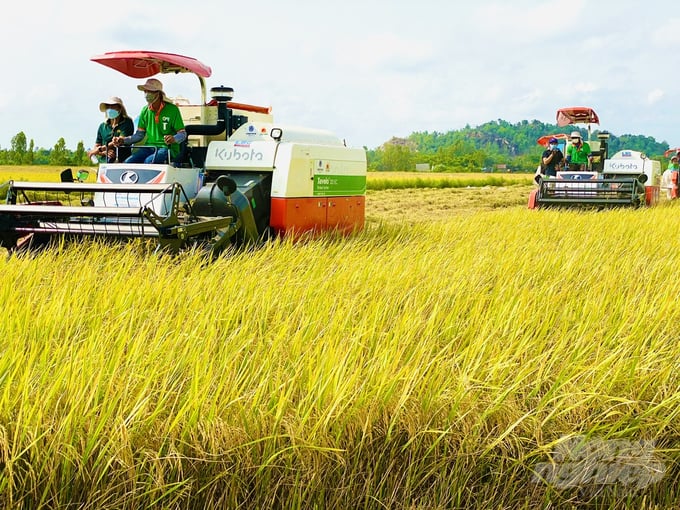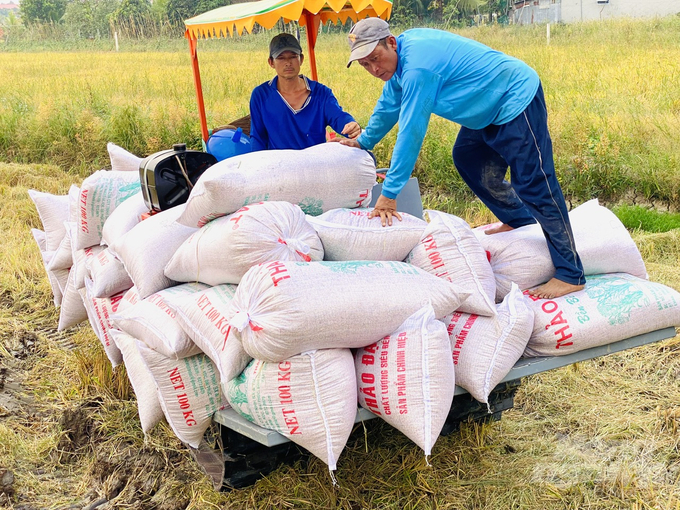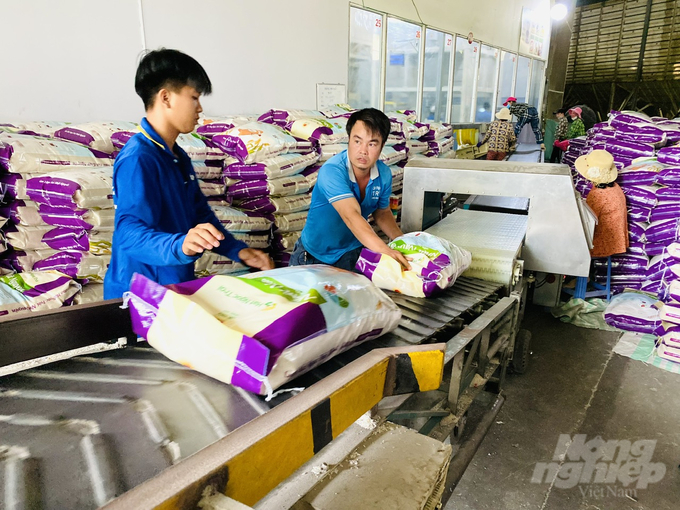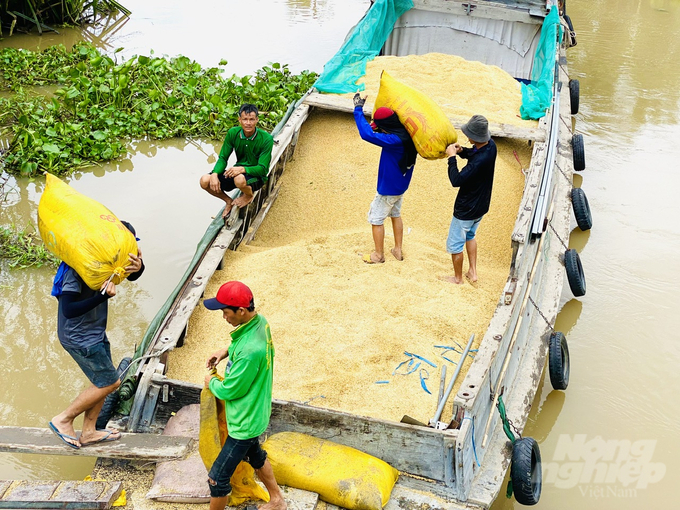
Rice Production Linkage Model with Loc Troi Group in Binh Thanh Cooperative, Thoai Son District, An Giang. Picture: Le Hoang Vu.
Recently, the Ministry of Economic Cooperation and Rural Development of the Institute of Policy and Strategy for Agriculture and Rural Development (MARD) in Long Xuyen City, in cooperation with the Ministry of Agriculture and Rural Development An Giang, held a seminar on promoting rural development. Promoting a sustainable linking of the rice value chain and adaptation to climate change in the Mekong Delta.
According to the Institute of Policy and Strategy for Agriculture and Rural Development, the total annual rice cultivation area of our country is about 4 million hectares, producing a production of 24-25 million tons/year in 2022 alone. Exports of 7.1 million tons, of which the Mekong Delta accounts for 90% of rice exports, the main export markets are the Philippines, China, Ivory Coast, the EU, Japan and the United States.
Currently, companies that buy rice from farmers often have to use middlemen, traders and “rice storks”. The proportion of rice consumed through links in companies, cooperatives and cooperative groups is still low, causing difficulties in rice consumption among the population. Companies connect above all when there are special requirements for product quality, such as B. Organic, Residue Control in Rice Grains, SRP, Security, GAP, GlobalGAP…

Currently, companies that buy rice from farmers often have to use middlemen, traders and “rice storks”. Picture: Le Hoang Vu.
Therefore, linking the rice value chain in terms of sustainability and climate change adaptation is now very important. The production link must ensure the following factors: Stable product consumption; Stabilize product consumption prices, limit price pressure season; creating conditions for the application of science and technology in production; to set up concentrated and large-scale production areas; Farmers produce products according to market demand and according to company directions. Synchronous application of the production process, uniform product quality…
Mr. Truong Kien Tho, deputy director of the Ministry of Agriculture and Rural Development of An Giang, said: An Giang is one of the most important rice producing and exporting provinces of the entire Mekong Delta region and the whole country. An Giang is also a pioneer province in building large fields, and is now the link between the production and consumption of rice and a variety of agricultural products with high efficiency, and contributes to the development of important raw materials and growth of agricultural products. income for rice farmers.

An Giang currently has 209 agricultural cooperatives and 22 cooperative unions, of which 37 cooperatives and two cooperative unions have Loc Troi Group Joint Stock Company employees. Picture: Le Hoang Vu.
According to Mr Tho, there are 209 agricultural cooperatives and 22 cooperative associations in An Giang province so far, with all resources focused on supporting rice production and linking along a sustainable value chain year to participate in the management and operations, linking the production and consumption of rice and glutinous rice to the Loc Troi Group. Specifically, in 2022, there are 63 agricultural cooperatives, 2 cooperative associations and 180 cooperative groups in the province, connecting agricultural production and consumption with organizations and enterprises. The area of the association is about 123,000 hectares.
From 2021 to 2022, the total area of rice production in An Giang is about 206,000 hectares, the main companies are Loc Troi Group, Angimex Company, Tan Vuong Food Company Limited, the company. Tan Thanh An Limited, An Thanh Company Limited , Gia International Joint Stock Company, Phuoc Thinh Company Limited…
At the workshop, cooperatives, cooperative groups and companies mentioned the existing problems in the link chain of rice production, such as: Farmers’ production scale is small, production is discrete and not in groups or interconnected through representative organizations of cooperatives and cooperative groups with large areas and produce homogeneous products.

The Institute of Policy and Strategy for Agriculture and Rural Development suggested that Mekong Delta provinces need to build a digital-based rice forum in the coming period to support cooperatives and cooperative groups. Picture: Le Hoang Vu.
Mr. Hoang Vu Quang, deputy director of the Institute of Policy and Strategy of Agriculture and Rural Development, said that the agricultural development phase by 2025 is organic farming, modern rural areas and civilized farmers. In particular, the digitization of agricultural development is very important, which will contribute to the expected development of agriculture.
According to Mr. Quang, there are currently many successful models of agricultural cooperatives in the rice industry, but there is a lack of information on how to share and replicate successes. Mr. Quang suggested that in order for the rice production chain to be sustainable, cooperatives and cooperative groups must move closer together, share information widely, and network in production.
In the coming period, the Mekong Delta provinces need to build a rice forum on a digitized platform to support cooperatives and cooperative groups, such as: online training for the topics of cooperative, building a document base for self-help, research and study; Share lessons learned from agricultural and rural development; Development of agricultural cooperatives, introduction of cooperative products to promote trade exchange of products and services between cooperatives; Store training progress information for the coop and finally provide the coop with the necessary information.

